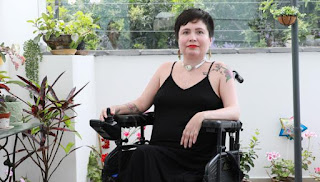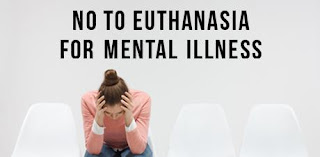Testimony in strong opposition to HB 6425
An Act Concerning Aid in Dying for Terminally Ill Patients
February 26, 2021
Senator Abrams, Representative Steinberg and members of the Public Health Committee:
 |
| Stephen Mendelsohn, Second Thoughts |
I am an autistic adult and one of the leaders of Second Thoughts Connecticut, a coalition of
disabled people opposed to the legalization of assisted suicide. Our group works with national
disability rights organizations including Not Dead Yet and the Disability Rights Education and
Defense Fund to oppose such legislation. Second Thoughts Connecticut is a member of the
Connecticut Suicide Advisory Board. Personally, I serve on the board of directors of
Euthanasia Prevention Coalition-USA and previously served on the Connecticut MOLST Task
Force.
HB 6425 would codify lethal and systemic disability discrimination into law. It does so by
redefining the suicides of a subset of disabled people as somehow not suicide, but a “medical
treatment option,” using the focus-group-tested euphemism “aid in dying.”
Suicide is defined as the act of taking one’s life intentionally. The person who intentionally
ingests a prescribed lethal overdose more closely fits the dictionary definition of suicide than
the despondent person who jumps off a bridge. The desire for suicide is a cry for help, even
when redefined as a “medical treatment option.”
The Connecticut State Suicide Prevention Plan 2025 posits a clear intersection between
assisted suicide and other suicide. Connecticut has the only comprehensive state suicide
prevention plan that includes disabled people as a high-risk population. To quote the relevant
section (pp. 57-58):
Discussions about assisted suicide for those with terminal illness intersect in important
ways with suicide prevention. The active disability community in Connecticut has been
vocal on the need for suicide prevention services for people with disabilities… [William]
Peace writes that “Many assume that disability is a fate worse than death. So we admire
people with a disability who want to die, and we shake our collective heads in confusion
when they want to live.”
Connecticut’s suicide prevention plan makes a number of important recommendations,
including “Do not assume suicide is a ‘rational’ response to disability or chronic illness.”
By contrast, Oregon’s state suicide prevention plan only deals with youth suicide—not adults of
any age, and certainly not disabled people or older people as high-risk groups. A quarter century of legalized assisted suicide in that state has led to a culture where the suicides of old,
ill, and disabled people are viewed as mere “acceptable losses” by suicide prevention
authorities—who all too often harbor ableist attitudes our state suicide prevention plan rejects.
In addition to attempting to redefine suicide, proponents of assisted suicide promote other
falsehoods.
Proponents claim assisted suicide is only available to people who will soon die. Yet not only
do many people far outlive “terminal” prognoses, including those who have received lethal prescriptions, but many disabled people are perceived as “terminally ill” by medical
professionals. Laws allow treatable medical conditions like diabetes to qualify as “terminal
diseases,” and HB 6425 is no different, as the definition of “terminal illness” in Section 1 (20)
does not say “regardless of treatment options.” Moreover, proponents have long sought to
expand suicide assistance to those with non-terminal disabilities.
They claim that their legislation is only for people in “deep and dire pain,” yet nothing in HB
6425 requires those seeking lethal overdoses to be in pain. Pain or the fear of it has never
been in the top five reasons people give for seeking assisted suicide, according to Oregon’s
annual reports. The overwhelming reasons people ask for assisted suicide involve not wanting to live the way disabled people do.
Proponents claim that there have been no abuses in states that have legalized assisted suicide, when the Disability Rights Education and Defense Fund has documented a list of
abuses and complications, including cases of prolonged and agonizing deaths. Moreover, as
the Oregon Department of Health and Human Services stated: “We are not given the
resources to investigate [assisted suicide cases] and not only do we not have the resources to
do it, but we do not have any legal authority to insert ourselves.” The only reason more
abuses have not been documented is that assisted suicide laws are designed to conceal them.
HB 6425 is actually worse than laws in other states by allowing both of the witnesses to the
request for the lethal prescription to be family members, heirs, or employees of the health care
facility where the patient resides, who can have a fiduciary interest in the patient’s earlier
death. The 2015-2020 Connecticut assisted suicide bills that were rejected all forbade either
witness from being in these categories. Along with the lack of any witness at the time of death,
this provision is an open invitation to elder abuse. Other ostensible safeguards are overcome
by doctor-shopping, which this bill makes easier than previous versions by allowing the
attending and consulting physicians to work together in the same office.
Advocates claim to be about patient choice, yet there have been instances when insurance
companies would pay for assisted suicide but not curative care. A state senator who serves
on this committee and is a leading assisted suicide proponent authored an op-ed in the
Hartford Courant proposing a separate bill that would “require the completion of advanced
directives in order to sign up for Medicare, Medicaid or private health insurance.” He spoke of
his proposal as a way of getting people to forgo curative care, thereby reducing healthcare
costs.
Proponents like to compare assisted suicide with pet euthanasia, but when we put
animals down—most of the time because they are unwanted or have behavior problems—the
animals do not get to choose. As the cheapest “treatment,” assisted suicide similarly diminishes choice, and especially so for people of color, disabled people, and others who have
been historically marginalized in our health care system.
Proponents demand legislation that mandates the falsification of death certificates. HB 6425
requires the underlying terminal illness be listed as the cause of death. If Connecticut follows
the lead of Oregon and Washington, this will forbid any mention of the lethal overdose.
Connecticut’s Division of Criminal Justice has twice submitted testimony in opposition to death
certificate falsification, stating:
Section 9(b) effectively mandates the falsification of death certificates under certain
circumstances. It states: “The person signing the qualified patient’s death certificate
shall list the underlying terminal illness as the cause of death.” This is simply not the
case; the actual cause of death would be the medication taken by or given to the
patient… The practical problem for the criminal justice system and the courts will be
confronting a potential Murder prosecution where the cause of death is not accurately
reported on the death certificate.
Finally, there is the issue of further expansion. Some proponents may claim they only want a
limited bill, but HB 6425 already guts some of the “safeguards” from previous bills. Moreover,
we only need to look at what Compassion & Choices and other proponents are saying, and
what bills they are pushing in other states. We can all remember when Compassion &
Choices’ president emerita Barbara Coombs Lee came to Hartford in October 2014 declaring
support for assisted suicide for people with dementia and cognitive disabilities unable to
consent; in her words, “It is an issue for another day but is no less compelling.”
We can also look at current expansion legislation being pushed by Compassion & Choices in
other states, particularly those in states that already have legalized assisted suicide, including
Oregon (which already has expanded its law), Washington, California, and Hawai‘i, as well as
bills in New Mexico. These bills have provisions that would dramatically shorten and/or waive
the mandatory waiting period, allow APRNs and PAs to prescribe lethal drugs, waive the
requirement for a second doctor to confirm the ostensibly terminal diagnosis, allow almost
anyone who does counseling for a fee to qualify in the rare case that the patient is referred for
a mental health evaluation, allow mail-order delivery of lethal overdoses, and compel objecting
providers to refer patients to other providers who will dispense lethal prescriptions.
This last provision, which is in California SB 380, is a threat to patient safety, as noted by the
example of Jeanette Hall, who sought to die under Oregon’s law but was persuaded by her
doctor to accept cancer treatment and is still alive more than 20 years later. Under a “do or
refer” regime supported by Compassion & Choices, people like Jeanette Hall would have their
lives cut short by years or even decades as ethical doctors will be forbidden to use their
professional judgment to encourage their suicide-minded patients to seek lifesaving treatment.
Moreover, once the concept of certain people having a right to assistance with their suicides to
end their suffering is codified into law, there is no limiting principle to prevent it from being
extended to other disabled people who also may claim to be suffering. If HB 6425 were
enacted, further expansion will move into the hands of judges. While we in the disability-rights
community view legalizing assisted suicide as a violation of the Americans with Disabilities Act
and the disability equal protection clause (Article XXI, amending Article V) of the Connecticut Constitution—people with certain disabilities are thus denied the benefit of suicide prevention
services—judges could easily use both of these provisions to require extending the “benefit” of
this “end of life option” to other disabled people. The limitations of “six months,” “terminally ill,”
“mentally competent,” and “self-administer” in HB 6425 all discriminate on the basis of
disability. Indeed, back in 1999, former Deputy Attorney General of Oregon David Schuman
wrote this response to state senator Neil Bryant regarding the issue of self-administration:
“The Death with Dignity Act does not, on its face and in so many words, discriminate
against persons who are unable to self-administer medication. Nonetheless, it would
have that effect....It therefore seems logical to conclude that persons who are unable to
self-medicate will be denied access to a ‘death with dignity’ in disproportionate
numbers. Thus, the Act would be treated by courts as though it explicitly denied the
‘benefit’ of a ‘death with dignity’ to disabled people....”
Indeed, the Connecticut Supreme Court’s ruling in State v. Santiago, striking down a
prospective repeal of the death penalty in favor of full repeal, shows how our courts can
expand laws beyond the intent of this legislature using equal protection grounds. The same
principle is at work with HB 6425, which gives suicide assistance to some while others get
suicide prevention, and the arbitrary difference is what disability they have.
So what about the person with ALS who has a six month prognosis, but has lost the ability to
self-administer? What about the person with Parkinson’s disease, who will have tremors for
years before dying? What about people with communication disabilities who may not be able
to make the request on their own? What about Grandma with dementia, or the person with a
severe psychiatric disability? Once the door to assisted suicide is pried open, Compassion &
Choices will seek to open it further through the courts, going from six months terminal to one
year, to perhaps five years; from assisted suicide to euthanasia; and from euthanasia for
terminal illness, to chronic illness, to mental suffering. This is how we go down the same road
as Canada, which is currently debating Bill C-7 to allow euthanasia even for non-physical
conditions, and where hospitals routinely deny treatment to disabled people while offering euthanasia instead. For Compassion & Choices, these are merely issues for another day, and
for them, no less compelling.
Legislators and the public should not be fooled by a privileged lobby that seeks to sell suicide
as a solution to their own disability-phobia. We should follow the recommendations of the
National Council on Disability’s report, “The Danger of Assisted Suicide Laws,” and reject
codifying lethal and systemic disability discrimination into law.

















